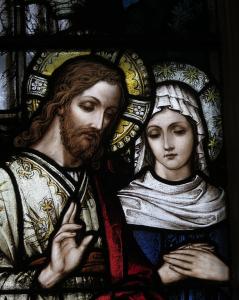And James Swan’s Unwarranted Conclusion from Luther’s Sermon, That He Was Accusing Her of Sin

“Please Hit ‘Subscribe’”! If you have received benefit from this or any of my other 4,600+ articles, please follow this blog by signing up (with your email address) on the sidebar to the right (you may have to scroll down a bit), above where there is an icon bar, “Sign Me Up!”: to receive notice when I post a new blog article. This is the equivalent of subscribing to a YouTube channel. Please also consider following me on Twitter / X and purchasing one or more of my 55 books. All of this helps me get more exposure, and (however little!) more income for my full-time apologetics work. Thanks so much and happy reading!
Martin Luther’s words will be in blue.
***
Anti-Catholic Reformed Protestant James Swan wrote an article entitled, “Luther: Mary Sinned” (2-16-06). He drew from Martin Luther’s second sermon on the First Sunday After Epiphany (1525), on Luke 2:41-52 (from Complete Sermons of Martin Luther, Volume 1, Michigan: Baker Books, 2000). What he cites from it, however, doesn’t support his contention that Luther was claiming that Mary sinned:
32. . . . you can see here how they err and falter, not only in this that they seek Christ and know not where to find him until they accidentally come to the temple, but also that they could not understand these words with which he censured their ignorance and is compelled to say to them: “Knew ye not, that I must be in the things of my Father?”
39. To this we should reply as is taught in this Gospel: Be they called holy, learned, fathers, councils, or any other name, even though they were Mary, Joseph and all the saints it does not follow that they could not have erred and made mistakes. For here you learn that the mother of Christ though she possessed great intelligence and enlightenment, showed great ignorance in that she did not know where to find Christ, and in consequence was censured by him because she did not know what she should have known.
46. . . . And although she had been sanctified by the Holy Spirit; yet he permitted her at times to err, even in the important matters of faith.
Why Swan concluded this is a deep, unfathomable mystery, since, first of all, mere ignorance in and of itself is not a sin (Acts 3:17; 17:30). Only obstinate or intransigent ignorance is (Eph 4:18). Luther in the above excerpts was discussing lack of knowledge, or ignorance. He stated in section 33: “God led her in such a way that he concealed much from her and daily permitted many things to happen which she had not known beforehand.”
Secondly, in the same sermon, Luther stated not just once, but twice, that he was not accusing Mary of sin (my italics):
13. Yea, though it may not be a matter of open sin, the devil can make sin of that which is no sin, and so move and terrify the heart that it will plague itself with the thought: . . .
22. . . . So here, the mother of Christ was forced to contend, even till the third day, with a heavy heart, which accused her as if she had lost the Son of God, a sin the like of which no one else on earth had committed, and she had to fear only the Most High; and yet truly there was no such sin, nor wrath, nor disfavor.
Luther in section 5 also stated that Mary was “greatly blessed with all grace and was a beautiful temple of the holy God.” And in section 33: “he guided and sustained her by his grace, although he had endowed her with many far greater gifts than others.”
Swan wants to constantly lecture Catholics about context in Luther’s writings (saying that we continually neglect it), yet he completely botches that aspect in his vapid analysis in this article? It’s laughable.
Luther does, however, accuse the Blessed Virgin Mary of an unseemly doubt and lack of faith, and I contend that this is absurd and completely unfounded, based on what we know from Luke 2. He projects onto her (and onto St. Paul elsewhere in his writings) the gargantuan and existential struggles with faith that he himself experienced, and this is completely unfounded and based on nothing but his own well-documented internal psychological turmoil and wrestling with recurring depression. Let’s take a look at the biblical passage in play:
Luke 2:42-50 (RSV) And when he was twelve years old, they went up according to custom; [43] and when the feast was ended, as they were returning, the boy Jesus stayed behind in Jerusalem. His parents did not know it, [44] but supposing him to be in the company they went a day’s journey, and they sought him among their kinsfolk and acquaintances; [45] and when they did not find him, they returned to Jerusalem, seeking him. [46] After three days they found him in the temple, sitting among the teachers, listening to them and asking them questions; [47] and all who heard him were amazed at his understanding and his answers. [48] And when they saw him they were astonished; and his mother said to him, “Son, why have you treated us so? Behold, your father and I have been looking for you anxiously.” [49] And he said to them, “How is it that you sought me? Did you not know that I must be in my Father’s house?” [50] And they did not understand the saying which he spoke to them.
I don’t think this is much of a big deal at all. Mary and Joseph were simply perplexed. So they asked, “why have you treated us so?” They didn’t understand. And I’m sure they would have been the first to admit that they wouldn’t always fully understand God the Son. They were simply worried about the whereabouts of their son. If parents didn’t worry in some strong sense about their children, when there was sufficient cause, I submit that they would be negligent, irresponsible parents. The passage doesn’t show Mary as a sinner, but rather, as a very human, normal, concerned parent, as all parents should be. We wouldn’t expect anything less of the Immaculate Mother of God.
Any parent — and I think, anyone, period, to a lesser extent — would immediately understand the emotional dynamics of the story, and Mary being sinless or Jesus being God doesn’t make the reaction any different (just as Jesus felt agonized anxiety in Gethsemane). Mary was a human being with emotions, just like the rest of us, and she experienced the especially intense and excruciating feelings of a mother looking for her “lost” child. I think once one realizes this, her recorded reaction is seen to be extraordinarily mild. Sin isn’t within a universe’s distance to it. This is ultra-normal parental emotions: as far from sin as the east is to the west. Thus, Luther wrote in ection 6:
For let us think for a moment, how she must have felt and grieved. Every father and mother can easily understand the misery and sorrow caused by the unavoidable separation from a dear child, when they know only that the child is lost. And even if the separation should last only an hour, how great are not the sorrow and lamentation, and how many tears are not shed, without consolation, without strength to eat, drink, sleep or rest, and with such misery that they would prefer to die. How much greater the suffering, if this condition were to continue for a day and a night, or even longer, when each hour must seem like a hundred years!
Nor does it necessarily follow at all that Jesus’ usual provocative and rhetorical (indeed, even “socratic”) questioning is implying sin on Mary’s part. He was simply challenging them to realize that He was anticipating His mission to come. Jesus was routinely misunderstood by almost everyone, including (quite often, before Pentecost) His own disciples (Mk 4:13; 6:52; 9:32; Lk 9:45; Jn 12:16). We should fully expect this, since He was the incarnate God, after all, Whose “ways” and “thoughts” are “higher” than ours, “as the heavens are higher than the earth” (Is 55:9).
It’s foolish to rush in and assume it’s because they were rebuked for sin: whether Mary is involved or anyone else. It’s mere rash speculation. This is an attempt to tear down the usual understanding of biblical passages by using a hyper-rationalistic, theologically liberal approach: truth be told. It’s an attitude of relentless skepticism, which is counter to a robust Christian faith. These are the sorts of questions that skeptical, Spirit-deprived atheists cynically ask about biblical texts (I know: I have dealt with such questions at great length).
But there is a further factor to consider, that classic Protestant commentaries (on Luke 2:44) have brought up:
Supposing him to have been in the company.—The company was probably a large one, consisting of those who had come up to keep the Passover from Nazareth and the neighbouring villages. It is not certain, but in the nature of things it is sufficiently probable, that the boys of such a company congregated together, and travelled apart from the others.
Supposing him to have been in the company . . .*1. In going to these great feasts, families and neighbors would join together, and form a large collection.*2. It is not improbable that Jesus was “with” them when they were about to start from Jerusalem and were making preparations. Seeing him then, they might have been certain as to his presence.*3. A part of the company might have left before the others, and Joseph and Mary may have supposed that he was with them, until they overtook them at night and ascertained their mistake.
A company would be made up of people from the same neighbourhood, well acquainted with one another. . . . It is quite conceivable how they should have gone on so long without missing the boy, . . .
In the numerous and rejoicing caravans of kinsmen and fellow-countrymen relations are often separated without feeling any anxiety.
8. The affliction and suffering she was compelled to endure were not of a nature that they had occurred without her fault, but her conscience forced her to remember how God had entrusted the child to her and that no one else was accountable for him, and hence storms burst and thundered in her heart: Behold, thou hast lost the child. This is no one’s fault but thine own; for thou shouldst have waited on him and looked after him, and not permitted him for a moment to go out of thy sight. How wilt thou give an account of this before God, since thou hast failed to watch over him? This is the result of sin and thou art no longer worthy to be his mother; yea, thou hast deserved to be condemned by him before all people, inasmuch as he has conferred on thee the great honor and favor of choosing thee for his mother.
9. Should not her heart have failed and fainted here from anxiety, for two reasons? First, because she lost her son and was unable to find him; secondly, which was the most severe of all and which could not happen to other mothers, making the pain all the more severe, because she must abhor herself before God, the only Father of the child, that he would no longer have or regard her as his mother, and hence she must be more sorrowful and sad at heart than any other woman on earth. In her own heart she regards herself guilty of the same sin as Eve, the first mother, who brought the whole human race to ruin. For what are all sins compared with this one, that she has neglected and lost this child, the Son of God and the Savior of the World? And if he should not be found, or, since he could not be lost, if God should have taken him back to himself, she would be the cause of preventing the completion of the work of the redemption of the world. Such and doubtless many other thoughts filled her heart with great fear, especially since she, as a pious child of God, had a very tender heart and conscience.
10. Here you may see how God dealt with the most holy person, the mother of his Son, even though she had been most highly honored by him and her joy in her Son had been immeasurably great, such as no mother ever had; and yet God so assailed her and she must be so divested of her honor and comfort that she cannot say, I am the mother of the Son. Previously she had been exalted to heaven, now she has been suddenly cast into deepest hell and is in such terror and sorrow that she might have despaired and died, and have wished that she had never seen the child, nor heard of him; and thus she might have committed a more grievous sin than any other person ever committed. . . .
18. Therefore, this holy Virgin was a real martyr for three days, and these days were heavier to her than was the external pain of martyrdom to other saints. She had had such anxiety on her Son’s account that she could not have suffered any more bitter pain, For that is the greatest torture and woe, when the heart is attacked and tortured. All other sufferings that assail the body are more endurable; yea, amid them the heart can be joyful and can scorn all bodily suffering, as we read concerning St. Agnes and other martyrs. That is only half-suffering when the body alone is afflicted, while the heart and soul remain full of joy; but when the heart alone is compelled to endure suffering only great and noble spirits, and special grace and strength, are able to endure it.
And in his first sermon on the same topic, Luther opined:
6. The great sorrow of the mother of Christ, who was deprived of her child, came upon her in order that even her trust in God might be taken from her. For she had reason to fear that God was angry with her and would no longer have her to be the mother of his Son. Nobody will understand what she suffered who has not passed through similar experiences. Therefore we should apply this example to ourselves, for it was not recorded for her sake, but for our benefit. She is now at the end of her sorrows; therefore we should profit by her example and be prepared to bear our sorrow if a similar affliction befall us.
7. When God vouchsafes to us a strong faith and a firm trust in him, so that we are assured he is our gracious God and we can depend upon him, then we are in paradise. But when God permits our hearts to be discouraged and we believe that he takes from us Christ our Lord; when our conscience feels that we have lost him and amidst trembling and despair our confidence is gone, then we are truly in misery and distress. For even if we are not conscious of any special sin, yet in such a condition we tremble and doubt whether God still cares for us; just as Mary here doubts and knows not whether God still deems her worthy to be the mother of his Son. Our heart thinks in the time of trial thus: God has indeed given me a strong faith, but perhaps he will take it from me and will no longer want me as his child. Only strong minds can endure such temptations and there are not many people whom God tests to this degree. Yet we must be prepared, so that we may not despair if such trials should come upon us.
It’s just Luther projecting his tumultuous inner strife onto Mary: as if everyone in their trials goes through the existential, Chicken Little angst that he habitually experienced.
***
*
Practical Matters: Perhaps some of my 4,600+ free online articles (the most comprehensive “one-stop” Catholic apologetics site) or fifty-five books have helped you (by God’s grace) to decide to become Catholic or to return to the Church, or better understand some doctrines and why we believe them.
Or you may believe my work is worthy to support for the purpose of apologetics and evangelism in general. If so, please seriously consider a much-needed financial contribution. I’m always in need of more funds: especially monthly support. “The laborer is worthy of his wages” (1 Tim 5:18, NKJV). 1 December 2021 was my 20th anniversary as a full-time Catholic apologist, and February 2022 marked the 25th anniversary of my blog.
PayPal donations are the easiest: just send to my email address: [email protected]. Here’s also a second page to get to PayPal. You’ll see the term “Catholic Used Book Service”, which is my old side-business. To learn about the different methods of contributing (including Zelle), see my page: About Catholic Apologist Dave Armstrong / Donation Information. Thanks a million from the bottom of my heart!
*
***
*
Photo credit: Saint Raphael Catholic Church (Springfield, Ohio) – stained glass, Wedding at Cana – detail (Nheyob: 11-22-14) [Wikimedia Commons / Creative Commons Attribution-Share Alike 4.0 International license]
Summary: Anti-Catholic Protestant polemicist James Swan contended that Luther said Mary sinned, in a sermon on Luke 2. He did not, but he also said some very weird things about Mary.













